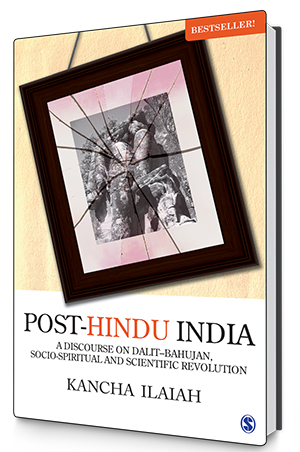|
 Post-Hindu India explores the social, spiritual, economic and educational deprivation imposed on the Dalit-Bahujan castes. Kancha Ilaiah critiques the intellectual imagination of the dominant communities and inspires the marginalized. Read more
Post-Hindu India explores the social, spiritual, economic and educational deprivation imposed on the Dalit-Bahujan castes. Kancha Ilaiah critiques the intellectual imagination of the dominant communities and inspires the marginalized. Read more
Paperback | 9788178299020
Rs 525
Rs 525
Read what critics are saying:
|
"Ilaiah’s book is…a detailed examination of the productive knowledge systems of the Dalit-Bahujan Communities in Andhra Pradesh…. This is an important work simply because it offers refreshing insights into an old religion that is considered to be a way of life in India." —The Telegraph
|
"The book is a reflective account of [the author’s] journey through castes and communities and highlights everyday clashes of caste cultures and conflict between "the productive ethic of Dalit-Bahujan castes and the anti-productive and anti-scientific ethic of Hindu Brahminism". —Tehelka
|
"The book is a passionate attempt to quench the thirst of the activists who hope for a social revolution."
—Financial Express |
"[THE] chapters are based on Illaiah’s deep knowledge of the productive life of the “lowered” castes, and provide illuminating detail of the techniques of production…. Ilaiah’s attack on Brahmanism is sharp and pointed, in some spots very convincing…. This is a challenging and useful book." —Dharma Deepika
|
India is doing an amazing job so far but I really hope that the government does something about poverty soon because it is already getting really out of hands.
ReplyDeleteInteresting. This looks super cool. I haven't read it all yet, but I'll be back to read the rest of it.
ReplyDeletehttp://ren-nydelse.dk/hus-og-hjem/robotplaeneklipper.html
I sent your articles links to all my contacts and they all adore it including me.
ReplyDeleteTennessee treatment center